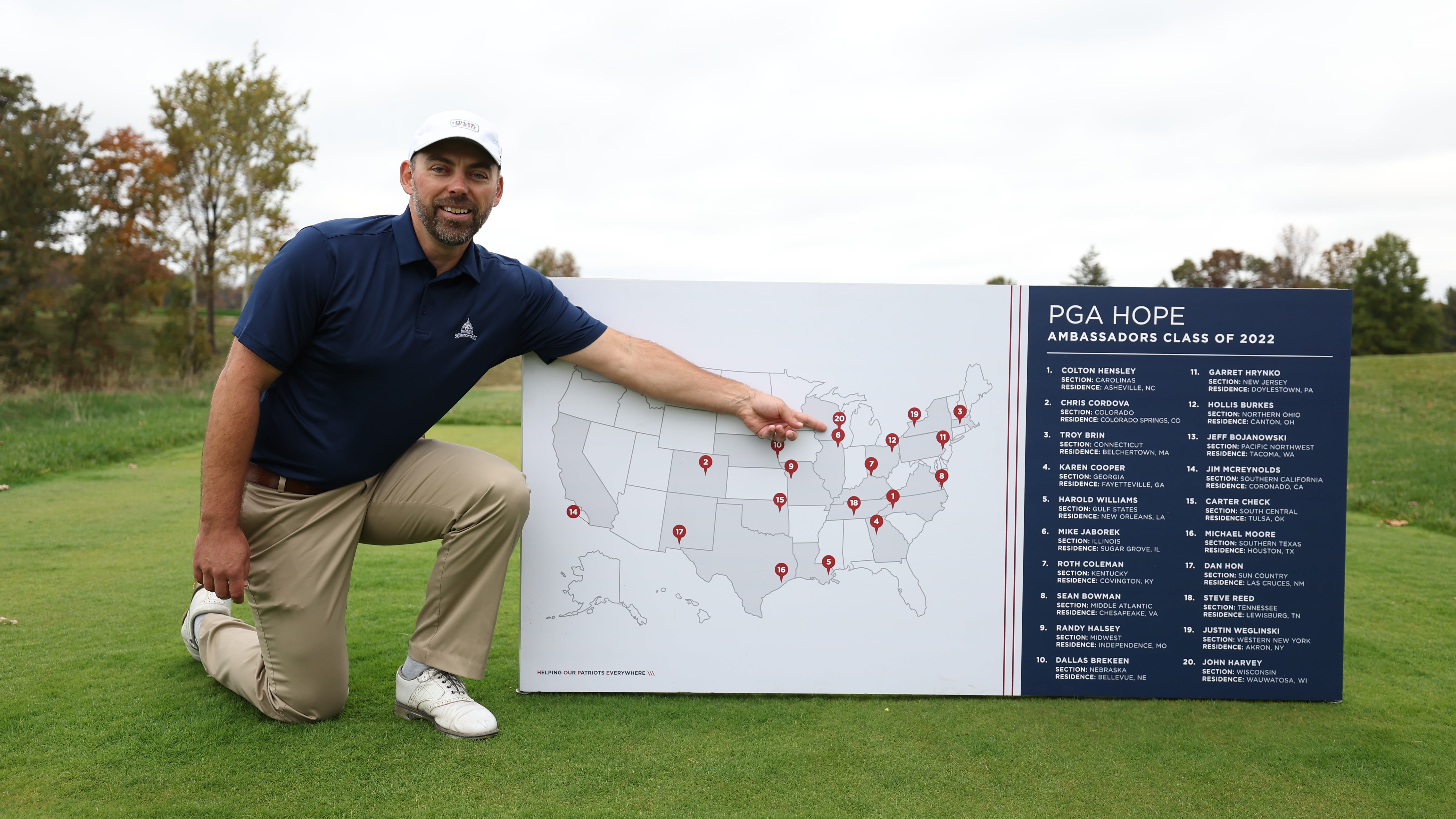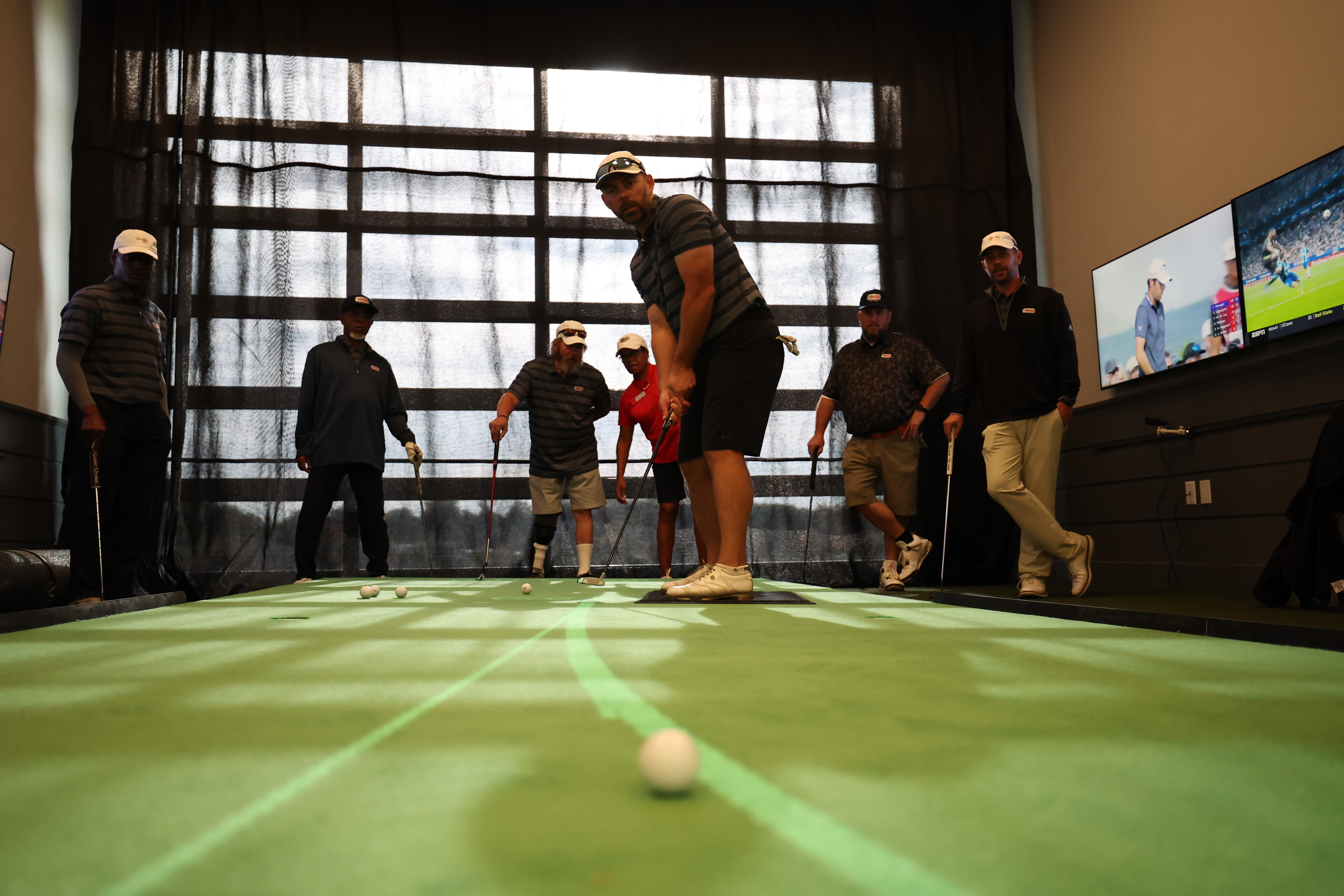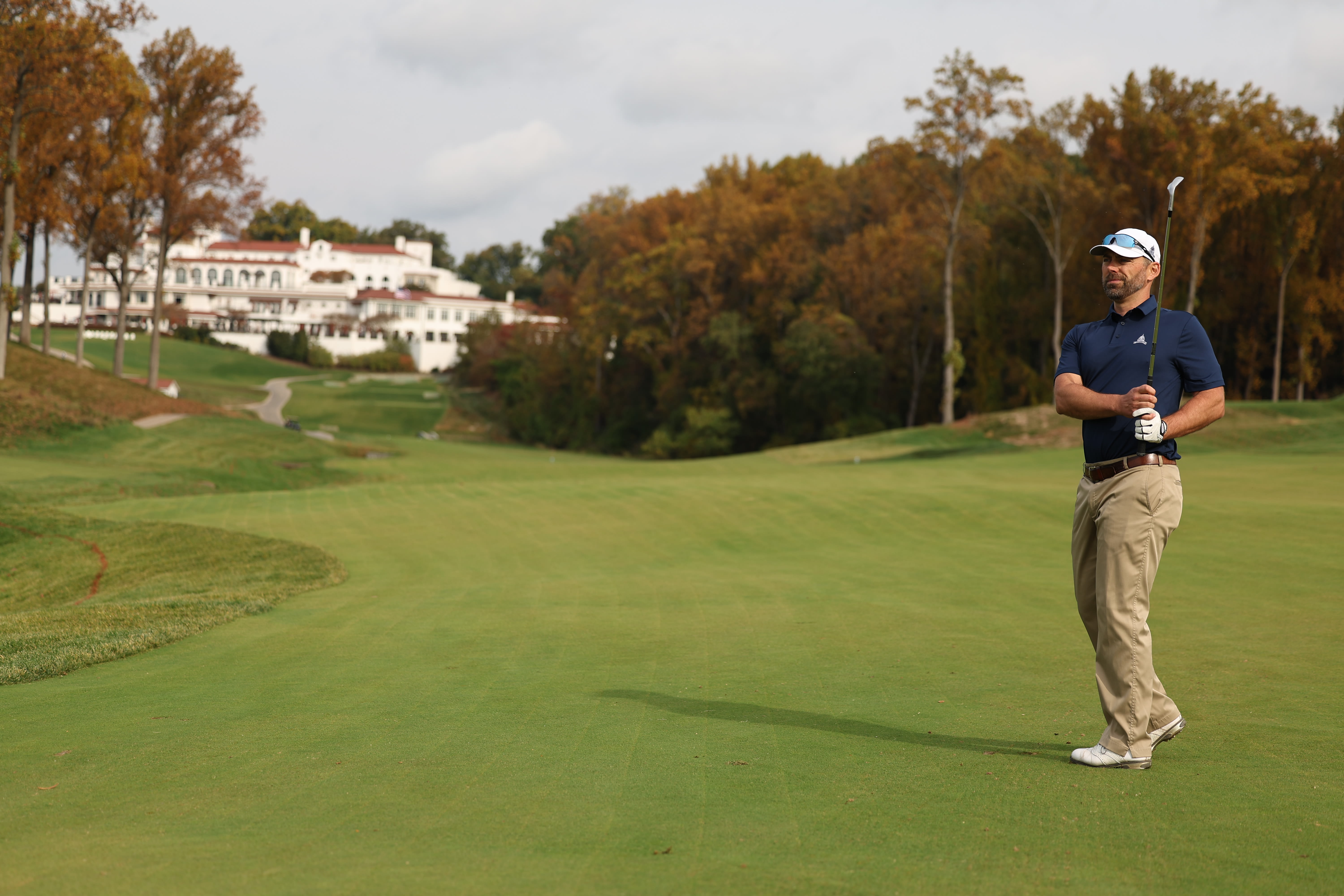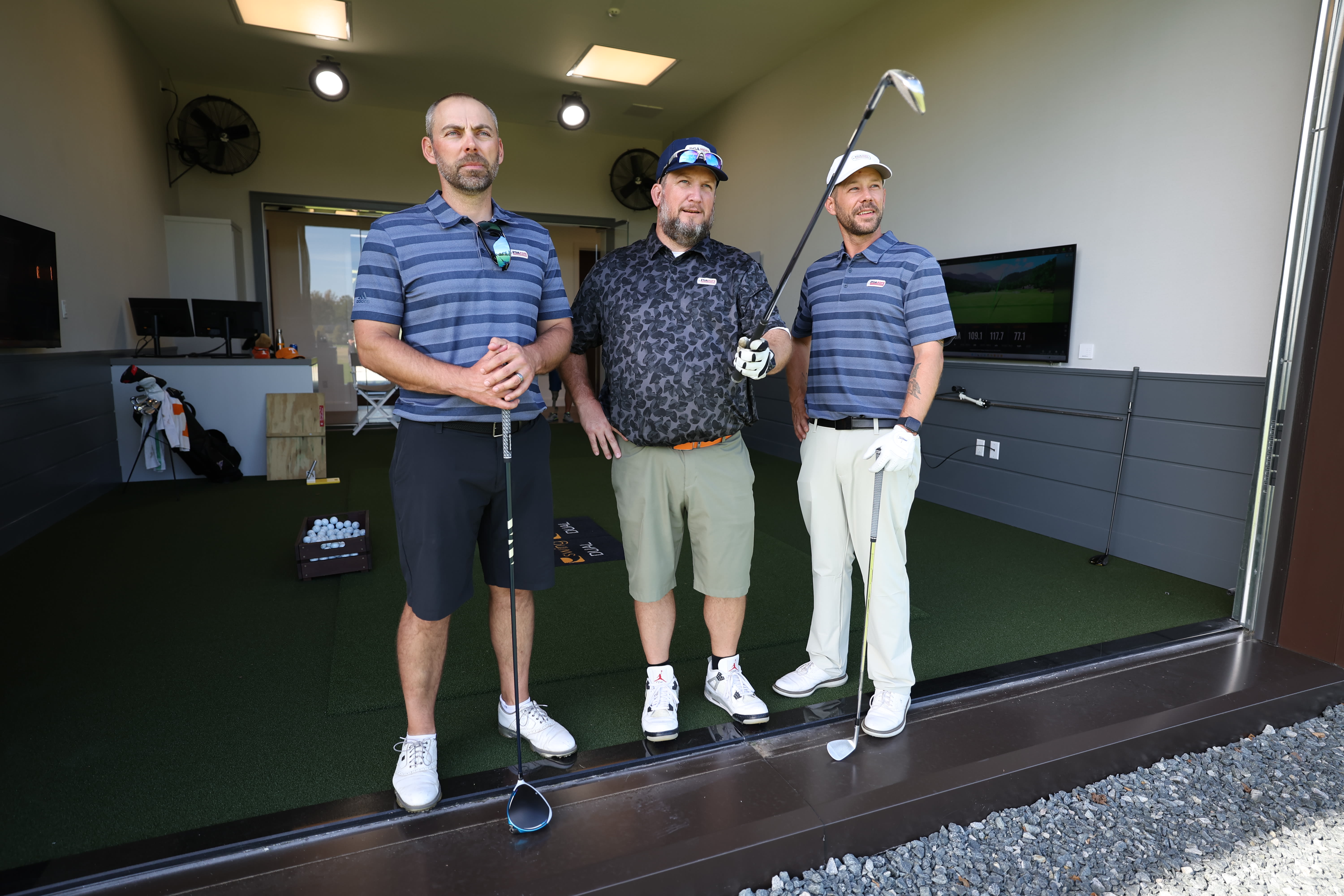Game Changers
Veteran Mike Jaborek Turning Isolation into Connection Through Golf
By Jay Coffin
Published on

Mike Jaoborek of Illinois was selected as PGA HOPE Ambassador last year.
Mike Jaborek is a gentle soul. He has a powerful golf swing, his handicap has dropped nearly 10 shots over the last two years and he’s always first in line to assist when playing with fellow Veterans who need a helping hand.
Because the game has brought him so much comfort over the years, he’s eager to show others how it can do the same for them.
When the 39-year-old retired U.S. Army Sergeant (2003-08) from Sugar Grove, Illinois, is asked to encapsulate his military service, he does so gladly and eloquently. But when he starts telling the story regarding the worst day of his life, he speaks in such a matter-of-fact tone that he makes it seem like his time spent serving was insignificant.
It was anything but.
Serving with valor in Iraq
Jaborek was stationed in Iraq for all of 2005. He was outside Buqubah for a period, where he says there was not much activity. That changed once he was transferred to Ramadi. The way Jaborek explains it, his crew was responsible for being the eyes and the ears of the battlefield. They were the watchdogs.
On Dec. 5, 2005, just three weeks before he was set to return home to the United States, Jaborek was on a mounted patrol as the gunner on a M2A2 Bradley as he and three others were on their way to the Ramadi Iraqi Government Center. The tanker was struck by an improvised explosive device (IED) and ignited in flames, setting Jaborek and Sergeant First Class Larry Campbell on fire. They attempted to douse the flames many different ways but they were unsuccessful. Ultimately, they found a puddle of raw sewage nearby and both ran toward that. Jumping into the mess did the job.
An injury report filed later stated that both men continued to be fired at during the nightmare, but Jaborek has no recollection of that. He and Campbell were transported back to camp, then airlifted to Balad, then on to Germany. After six days there Jaborek was flown to Fort Sam Houston in San Antonio. He had burns on his back, arm and hand. One leg was shattered.
Jaborek was awarded a Purple Heart.
“I don’t look at it as a big deal because I made it home,” he says. “It’s hard to describe it looking back. What bothers me most was seeing other guys from over there pass away. I wanted to have done more for them. That’s where most of my PTSD comes from. Other guys didn’t make it home.”
Jaborek stayed in the military another three years and even did another 15-month tour to Iraq. Thankfully this time there was less action, although there were still many hairy days and nights.
The first thoughts of entering the military came because of the 9/11 terrorist attacks. Jaborek was in college and was building homes for a living, but he needed a change. So he took the plunge and never looked back. He’s thankful he had the honor of serving his country, but in Aug. 2008, he felt it was time to move on.
Golf to the rescue

Mike Jaborek with fellow PGA Hope Ambassadors at last year's PGA HOPE National Golf & Wellness Week.
The transition to civilian life was difficult. Jaborek knew what he wanted to do, but it wasn’t so simple. He enrolled in college, and within two weeks of Army retirement he was taking accounting classes at Illinois State, where he would ultimately graduate and get a job. (He currently works for J.P. Morgan and underwrites mortgages.)
But he was drinking heavily. Too often. He was pulled over one evening and charged with driving under the influence, something he’s embarrassed about, but owns and has learned from.
Golf has been one of his biggest coping mechanisms over the past decade.
Jaborek had long been familiar with the game. He played often while in middle school but was also into many other sports. He worked in high school, which took up most of his free time. During his military career he figures he played 10 rounds max.
In late 2012, Jaborek was watching golf on television when he saw an ad for a Veteran golf military service organization, which provided rehabilitative golf programs and clubs for post-9/11 wounded Veterans. That was the proper kick he needed to reengage with the game.

Jaborek says golf has helped him immensely in dealing with PTSD.
He attended sessions at Mistwood Golf Club in Romeoville and enjoyed his time there. He was selected to compete in the Warrior Open in 2018, an event in Texas that he raves about which is run by former President George W. Bush and the Bush Center.
Then Jaborek’s interest in the game ratcheted up two years ago when he first heard of PGA HOPE, which had a program at a golf course close to him. PGA HOPE (Helping Our Patriots Everywhere), a flagship military program of PGA REACH, is the charitable foundation of the PGA of America. It introduces golf to veterans to enhance their physical, mental, social and emotional well-being.
This is when Jaborek met Kathy Williams, a PGA HOPE Lead Instructor who was running a session at Veterans Memorial Golf Course. They’ve been friends since.
Jaborek took his initial six-week program so seriously that his handicap immediately dropped from a 20 to a 15. He figures that a couple months after the program it was down to a 12. These days he plays to a 10.
He’s obsessed with all facets of the game – his own, helping other Veterans and helping the PGA HOPE program grow. It’s one of the reasons why Jaborek was selected to be the Illinois PGA Section’s PGA HOPE Ambassador, which means he was one of 20 veterans chosen to participate in the program’s National Golf and Wellness Week last October in Washington, D.C.
“He’s such a gentle giant,” Williams, an LPGA Professional, says. “He doesn’t say much, but when he does it’s very powerful.
“He’s the type of guy who is always willing to help. He’s always there early and always staying late. He’s one of those guys who is always thinking about the needs of others, not just himself. I absolutely love that about him.”
Turning isolation into connection
Golf helps Jaborek continue to deal with PTSD, which affects him almost daily. Driving down certain roads give him issues. He’s not particularly fond of seeing trash on the side of the road. Potholes are a big trigger. He’s had night tremor flashbacks and occasionally wakes up in the middle of the night yelling for help.
Oftentimes he’ll touch something that instantly makes him think about the most difficult days.
“Something like that can shut me down for an hour,” he adds. “I’ll look up and I can’t believe how much time has gone by.
“But it’s something you have to learn how to deal with.”
Jaborek is married and has three children, 7-year-old twin boys and a 6-year-old daughter. Wife Kristina knows when her husband is frustrated and can sense when he is having a difficult time. That’s when she insists that he goes to hit golf balls, which is something that isn’t always the easiest to accomplish during winters in the Midwest. But it’s working and Jaborek feels like he’s in a good place, especially with the spring right around the corner.
Ask Jaborek about his golf goals and you get a terrific sense of his gentle soul and thirst to help others who are in the same boat. He’ll mention a few things he’d really like to accomplish within his own game, but he can’t help himself from quickly pivoting to talk about others.
“I want to shoot even-par on 18 holes just once,” he says. “A hole in one would be nice, too. But my real goal is to help out as much as I can; help veterans, have more clinic locations and help create that camaraderie.
"Instead of feeling isolated I want to make a connection, contact Veterans and reach out. It’s my ultimate goal in this game.”

Through golf, Jaborek (far left) hopes to wipe away isolation and connect with other Veterans.
To learn more about PGA HOPE and find a program near you, click here.
